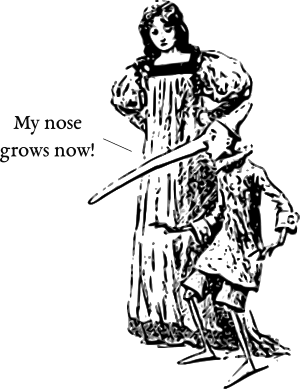Pinocchio paradox facts for kids
The Pinocchio paradox happens when Pinocchio says, "My nose grows now." It's a special kind of problem called a liar paradox. A liar paradox is a statement that creates a contradiction. For example, "This sentence is false" is a liar paradox. If that sentence is true, then it must be false. But if it's false, then it must be true! This goes on forever.
The Pinocchio paradox is similar but unique. It doesn't involve words like "false" or "true" in the statement itself. Pinocchio's nose only grows when he tells a lie. So, if he says "My nose grows now," it creates a tricky situation. It's not about Pinocchio being a known liar in general. If he said, "I am getting sick," that could be true or false. But "My nose grows now" can't be either true or false without causing a problem.
Contents
The Paradox Explained
The paradox comes from Pinocchio saying, "My nose grows now." In the original story, Pinocchio's nose gets longer whenever he tells a lie. So, what happens if he says this specific sentence?
Let's think about it:
- What if Pinocchio's statement "My nose grows now" is true?
* If it's true, then his nose *is* growing. * But his nose only grows when he lies. * So, if his nose is growing, it means he must be lying. * But if he's lying, then his statement "My nose grows now" must be false. * This means if the statement is true, it also has to be false!
- What if Pinocchio's statement "My nose grows now" is false?
* If it's false, then his nose *is not* growing. * But if his statement is false, it means he is telling a lie. * And when Pinocchio lies, his nose grows. * So, if he's lying, his nose *should* be growing. * This means if the statement is false, it also has to be true!
As you can see, no matter if you assume the statement is true or false, you end up with a contradiction. It's like saying, "Pinocchio's nose is growing if and only if it is not growing." This is why it's a version of the famous liar paradox.
Thinking About Solutions
People have thought about different ways to understand this paradox.
Future or Present?
Some people wonder if the tense of the sentence matters. What if Pinocchio says, "My nose *will be* growing"? Or "My nose *is* growing now"?
One idea is that if Pinocchio says "My nose will grow now," it's a prediction. If a prediction turns out to be wrong, it doesn't mean you lied. For example, if you predict it will rain tomorrow and it doesn't, you didn't necessarily lie. You just made a wrong guess. So, if Pinocchio's nose doesn't grow after he says this, maybe he just made a false prediction, not a lie.
However, Pinocchio knows his nose grows *only* when he lies. So, if he says "My nose grows now," he's basically saying, "I just told a lie." If he's saying that, it's more like an observation or a guess about what's happening because of a previous lie. In this case, the statement itself might not be a lie.
Using Common Sense
Often, with paradoxes, thinking about the real world can help. Pinocchio's nose grows to teach him a lesson about honesty. It's a magical consequence of lying.
So, if Pinocchio says "My nose grows now," he's not trying to deceive anyone. He's making a statement about his nose. Since he's not intentionally lying when he says "My nose grows now," his nose wouldn't grow. It's not a lie; it's a statement that creates a logical puzzle. His nose only grows when he's being dishonest on purpose. A false prediction isn't the same as a lie. Therefore, his nose wouldn't grow.
See also
 In Spanish: Paradoja de Pinocho para niños
In Spanish: Paradoja de Pinocho para niños
 | Mary Eliza Mahoney |
 | Susie King Taylor |
 | Ida Gray |
 | Eliza Ann Grier |


